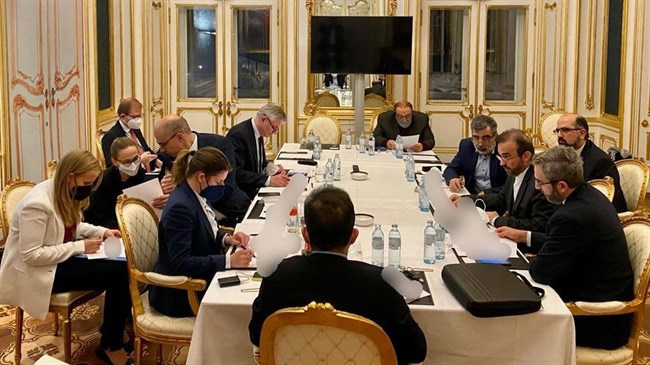No ‘external factors’ can affect Iran’s interests in Vienna: FM

International Desk
Iran on Monday said that it would not allow any external factors to affect its national interests in the Vienna talks aimed at reviving the 2015 nuclear deal, known as the JCPOA.
“While sticking to [our] red lines, we will not allow any external factors to interfere with the country’s national interests in the Vienna talks,” Foreign Minister Hossein Amir-Abdollahian said, according to IRNA.
Amir-Abdollahian stressed that Iran was determined to “finalize a good and firm deal” on the JCPOA revival and would adhere to its red lines to get “effective economic guarantees”.
Talks to restore the JCPOA, underway in Vienna, involve Iran as well as Britain, France, Germany, Russia, and China directly, and the United States indirectly.
The multilateral accord began unraveling when former US president Donald Trump withdrew from it in 2018 and reimposed sanctions.
Iran now seeks the removal of those sanctions in a verifiable fashion and firm assurances that the US would not repeat the walkout.
On Saturday, Russia’s Foreign Minister Sergei Lavrov said that Moscow wants written guarantees from Washington that Western sanctions imposed on it over the Ukraine conflict would not affect its economic and military cooperation with Tehran, AFP reported.
Iran said on Monday that it was awaiting “details” on Russia’s demands for US guarantees that could potentially delay reaching an agreement in talks aiming to restore Tehran’s 2015 nuclear deal with world powers.
“We are waiting to hear the details of that through diplomatic channels,” Foreign Ministry spokesman Saeed Khatibzadeh said at his weekly press conference.
“Iran’s peaceful nuclear cooperation should not be affected or restricted by any sanctions, including Iran’s peaceful nuclear cooperation with Russia, China and other countries,” he said.
As with the original agreement, Moscow is expected to play a key role in the implementation of any fresh deal with Tehran, for example by receiving shipments of enriched uranium from Iran.
“Russia’s approach so far has been a constructive one in order to reach a collective agreement in Vienna,” Khatibzadeh stressed.
Russia’s Ambassador to Tehran Levan Dzhagaryan said Monday that the Russian government planned to give to Iran an explanation of the guarantees it has requested from the US.
‘New initiatives’ needed
Ali Shamkhani, the secretary of Iran’s Supreme National Security Council, said actions and reactions of participants of the Vienna talks were based on their interests and, therefore, “understandable”.
But he noted that securing the interests of the Iranian people was the only factor affecting the course of the negotiations.
“We’re assessing new elements that bear on the negotiations and will accordingly seek creative ways to expedite a solution,” the top security official tweeted.
In another tweet, Shamkhani called on the US to make political decisions.
“Priority of Iranian negotiators is to resolve remaining issues that are considered red lines. Rapid access to a strong deal requires new initiatives from all parties,” he pointed out.
US Secretary of State Antony Blinken sought on Sunday to dispel talk of obstacles, saying the sanctions imposed on Russia over Ukraine had nothing to do with the JCPOA, Reuters reported.
“The sanctions that have been put in place ... on Russia have nothing to do with the Iran nuclear deal and the prospects of getting back into that agreement,” Blinken said. “These things are totally different and just are not, in any way, linked together. So I think that’s irrelevant.”
“We continue to engage with Russia on a return to full implementation of the JCPOA,” a State Department spokesperson said.
All parties involved in the talks say progress has been made toward the restoration of the JCPOA. But both Tehran and Washington have said there are still some significant differences to overcome.
Source: Iran Daily

